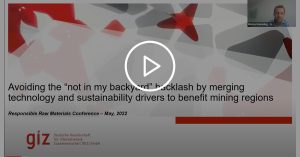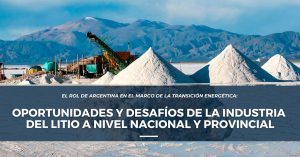
The MinSus Programe and the UN Women Win-Win Program organized the intersectoral dialogue “The role of women in building a more sustainable economy: experiences from the mining and energy sector”. The online event was held on May 20th, and included the participation of regional and international experts in the field.
Monday, May 24, 2021
The intersectoral dialogue was held with the objective of making visible the participation of women in development and in the transition towards a more sustainable and green economy, through an analysis of the programs and public policies of the mining and energy sector with a gender approach, and women’s contribution to innovative solutions that drive this transition towards a greener economy and triple impact solutions through concrete initiatives from the business sector.
The event was jointly organized by the Win-Win Program, implemented by UN Women and the International Labour Organization with the financial support of the European Union, and the Regional Cooperation Program for the sustainable management of mining resources in the Andean countries (MinSus) implemented by the Deutsche Gesellschaft für Internationale Zusammenarbeit (GIZ) and the Federal Institute for Geosciences and Natural Resources (BGR), on behalf of the Federal Ministry for Economic Cooperation and Development (BMZ).
María Inés Salamanca, Coordinator of UN Women in Chile and Partnership and Resource Mobilization Specialist for Latin America, pointed out that “in order to achieve gender equality, the commitment of the public and business sectors to eliminate the barriers and obstacles that hinder the incorporation and full participation of women in the different sectors of the economy and business is fundamental. This Intersectoral dialogue shows how traditionally male-dominated sectors are taking up the challenge of combining profitability with sustainability and gender equality. In recent years, numerous studies have shown that promoting greater participation of women in productive and managerial areas contributes to the variety of perspectives and helps increase creativity and innovation, which is especially important in the changing economic environment in which we find ourselves as a result of the pandemic, which requires effective solutions and the contribution of different approaches”.
For her part, MinSus technical advisor, Cristina Muñoz emphasized that “the energy and mining sectors are called to be an engine of development and economic reactivation. The transition towards more sustainable economies, based on the energy transition and the fight against climate change, will demand more minerals, many of which are abundant in our region. This represents a renewed opportunity to promote better management and governance of the energy and mining sectors in which women have an equitable and fair role, both in decision-making related to the sector, in their associations, companies and the public sector, as well as in their labor insertion and in the mitigation and reduction of socio-environmental impacts that fall mostly on women in the communities”.
Muñoz added that “this must be done by developing and strengthening impact assessments and due diligence processes with a gender focus, effective consultations with communities, compensation processes, the protection of women defenders of nature and human rights, access to information and the production of gender-disaggregated data, and access to justice and remedy, among other key pillars”.
Due to the importance of the mining and energy sectors in Latin America and the Caribbean, the equal incorporation of women in these industries is an essential condition for the closing of gaps and sustainable and inclusive development. We need to move forward more decisively and jointly in measuring and addressing the differentiated needs of men and women in the sector as ignoring it often puts women at a disadvantage, and even at risk.
Please see the recording of the webinar below:
 Contact us
Contact us Newsletter
Newsletter Courses
Courses

